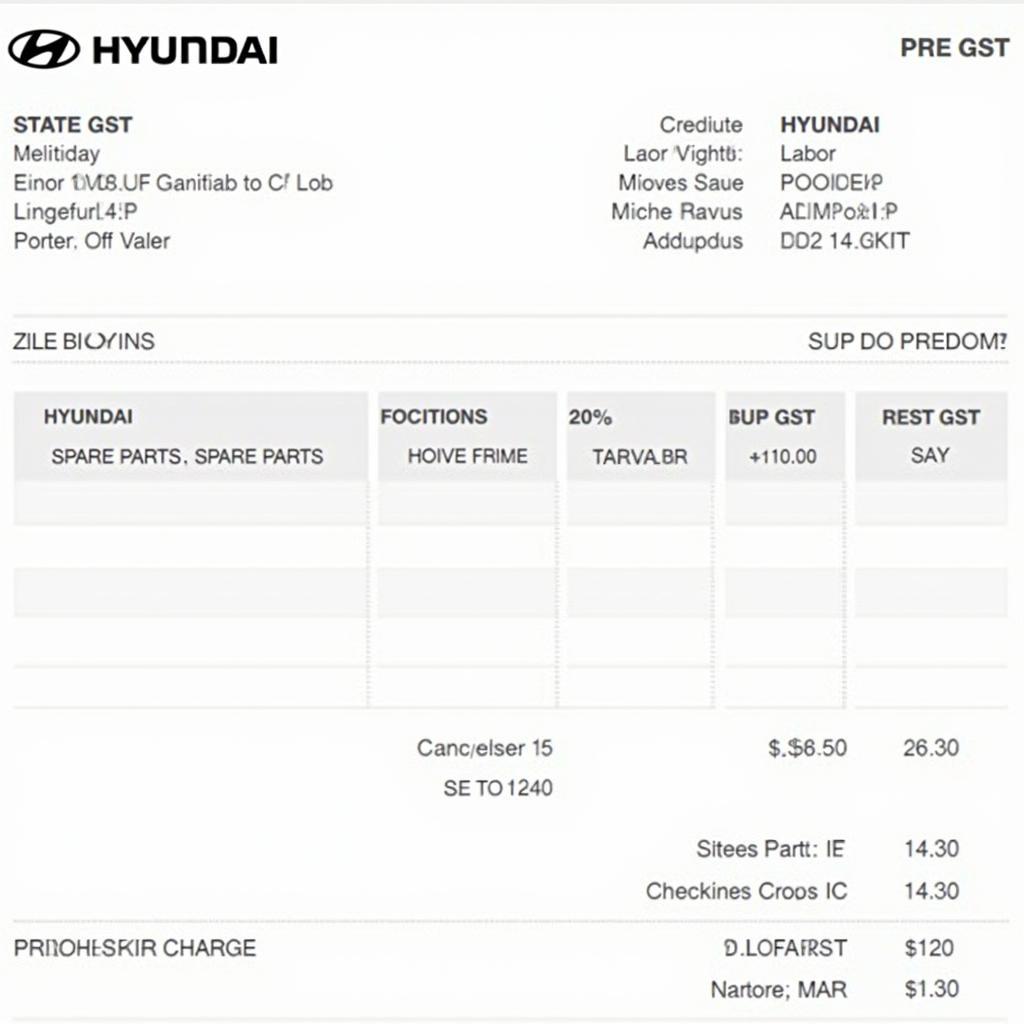Understanding the ins and outs of Goods and Services Tax (GST) as it pertains to your Hyundai can feel like navigating a maze. The introduction of GST in India brought a wave of changes across various sectors, and the automotive industry was no exception. For Hyundai owners, this meant a shift in the overall cost of car ownership, especially when it comes to servicing.
This comprehensive guide aims to demystify “Hyundai Car Servicing After Gst,” providing you with clarity on the impact of GST on various service components and empowering you with the knowledge to make informed decisions about maintaining your Hyundai.
How GST Impacts Your Hyundai Service Costs
Before GST, a complex system of multiple taxes, including VAT, excise duty, and service tax, was applied to car services. This often led to a lack of transparency and made it difficult to determine the exact tax component of your bill. GST aimed to simplify this by subsuming most of these taxes into a single, unified tax structure.
Here’s how the introduction of GST changed the game for Hyundai owners:
- Spare Parts: GST on spare parts is categorized under the 28% slab. While this might seem like a significant number, it’s crucial to remember that the previous system included a combination of taxes that often added up to a comparable figure.
- Labor Charges: Labor charges in the automotive industry fall under the 18% GST slab. This standardization potentially brought down the overall tax burden on labor compared to the pre-GST era.
- Service Charges: Similar to labor, service charges also attract an 18% GST.
Decoding Your Hyundai Service Bill Post-GST
Understanding how GST applies to individual components is just the first step. To truly grasp its impact on your Hyundai’s service cost, you need to analyze the bigger picture.
Let’s break down a typical Hyundai service bill post-GST:
- Basic Service Charges: This covers routine procedures like oil changes, filter replacements, and general inspections, typically attracting an 18% GST.
- Spare Parts: The 28% GST on spare parts plays a significant role in your overall bill. The more extensive the repairs or replacements, the more noticeable the impact of GST will be.
- Consumables: Items like engine oil, coolants, and brake fluids also fall under the GST purview, potentially affecting their prices.
Example: Imagine your Hyundai requires a major service, including replacing the timing belt. The timing belt, being a spare part, will attract a 28% GST. However, the labor charge for replacing the belt will have an 18% GST.
Navigating Hyundai Car Servicing in the GST Era
“The introduction of GST brought a new level of transparency to car servicing,” says Rajesh Kumar, Senior Automotive Analyst at CarServiceRemote. “Hyundai owners can now easily see how much tax they’re paying on each component of their service bill.”
Here are some practical tips for Hyundai owners to manage their service expenses in the GST era:
- Regular Maintenance is Key: Sticking to your Hyundai’s recommended service schedule can help prevent major issues down the line, minimizing the need for costly spare part replacements and potentially reducing the impact of GST.
- Shop Around for Competitive Prices: Don’t hesitate to compare service costs and spare part prices from different Hyundai authorized service centers and reputable independent garages. This can help you find the best value for your money.
- Inquire About Discounts and Offers: Many service centers run promotional offers and discounts on spare parts and labor, especially during festive seasons. It’s always a good idea to inquire about such deals.
Conclusion
While the introduction of GST brought a standardized tax structure to Hyundai car servicing, understanding its nuances is crucial for managing your ownership expenses. By being informed about the GST slabs applicable to different service components, comparing prices, and planning your service visits strategically, you can ensure your Hyundai continues to deliver a smooth and cost-effective driving experience.


